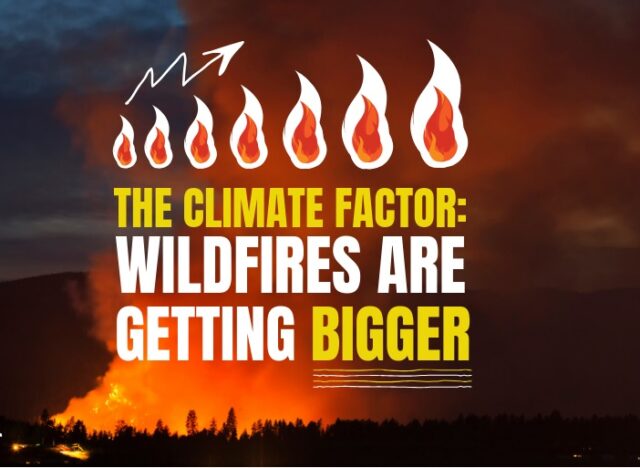And smoke from the megafire blankets much of Canada and the United States
[12 Maggio 2023]

The election campaign took place on May 8 Suspended Fires threaten homes and lives in at least six blocks in Canada’s western province of Alberta. Earlier in the week, more than 30,000 Albertans received mandatory evacuation orders as 108 wildfires burned across the province, 31 of which were classified as “out of control.” Alberta has recorded 427 wildfires since the start of the year, burning 410,000 acres, more than double the five-year average acres burned in a full season.
Neighboring Canadian provinces British Columbia and Saskatchewan have seen fires and evacuations in recent days. Like Alberta, British Columbia is expecting unusually warm days between now and May 16, raising concerns about both wildfires and flooding from snowmelt. On May 15, temperatures are expected to reach 30C near Fort St. John on the British Columbia-Alberta border, where a large fire is burning.
Canada has sent 300 soldiers to help firefighters contain the Alberta wildfires and continue to evacuate affected communities. The fire has closed 28 schools and forced 6,000 students to stay home.
Keith Stewart of the University of Toronto and York University, Greenpeace Canada’s senior energy strategist, said, “Protecting lives, livelihoods and homes should be a priority in times of crisis like this. That means getting people out of the way. Fires and support to first responders who are making extraordinary efforts to bring the situation under control.” No doubt there will be some who say that the debate should stop there, and who will say that critical times are not the time to talk about our best selves. Climate scientists have warned The longer we take to respond to the climate crisis, the more common and more devastating weather-related disasters will become. “Silence will do great harm to those fleeing fires now and those who needlessly face danger in the future.”
According to Stewart, “The hard truth is that our production and use of fossil fuels is fueling climate change and making wildfires worse. Natural Resources Canada reports Wildfire conditions are expected to increase across Canada due to climate change. This would more than double the amount of area burned by the end of this century compared to the amounts burned in recent decades. Boreal forests, which have been heavily affected by fire throughout history, are likely to be particularly affected by this change. This is no longer a problem for the future. A Scientific evaluation During British Columbia’s record-breaking fire season in 2017, climate change made the responsible weather conditions 2 to 4 times greater and increased the area burned 7 to 11 times.
Yet ahead of the Alberta election, pundits predict the two major parties will avoid discussing climate change during the campaign. “In an attempt to moderate the debate, the United Conservative Party (UCP) put forward a ‘plan’ on climate change that included only interim targets or new measures,” recalls Stewart.desire Reach net zero by 2050. So far, the Alberta New Democratic Party (Alberta NDP) Rest in peace with our awards (certainly much stronger prizes than the UCP), perhaps assuming they’ve got the climate-conscious vote. Keeping silent about the role of fossil fuels in disrupting people’s lives and destroying their homes only serves the oil and gas companies that profit from their sales. This increases inequalities, such as how indigenous communities are more at risk because they are more likely to live in remote areas where access and fire control are difficult. As the continued use of fossil fuels during the climate emergency is playing with fire, these fires should serve as a wake-up call for a rapid transition to clean energy. If the political parties do not include it in the election agenda, we hope the voters will.
At a press conference, Alberta’s Emergency Preparedness Minister Mike Ellis (UCP) said, “I agree that this continues to be a very stressful time for many Albertans. As temperatures have cooled in the province in recent days, the region has a warmer and drier weekend than usual, increasing the risk of wildfires.
Meanwhile, Alberta wildfires have left much of Canada and much of the United States in a state of smoke. Early May typically marks the start of the region’s wildfire season, but experts say this level of activity is unusual and temperatures are expected to rise sharply in the coming days, fueling concerns about more fires to come.
Images taken by the US National Oceanic and Atmospheric Administration (NOAA) show that smoke from the Alberta wildfires has reached eastern Canada, Quebec and Ontario, as far as the US-Canadian border. And NOAA warned that “Canada’s wildfire season is off to an unusually active start.” NOAA Fire and Smoke Map – One of the largest countries in the world shows much of Canada covered in light to moderate smoke, which also hangs over the Northeast and Mid-Atlantic regions of the United States.
The bright orange sunset that lit up the sky over Washington DC on May 11 was “caused by smoke from Canadian wildfires,” the US National Weather Service explained. [che] Suspended in the upper atmosphere.





Leave a Reply